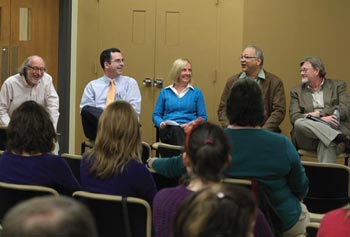
Vanderbilt researchers from the Department of Pediatrics, Peabody College and the Divinity School joined with parent advocates for a panel discussion on the ethical considerations of “curing” disabilities on April 5.
The event was sponsored by the Vanderbilt Kennedy Center to inform the university community about ethics related to conducting research, especially issues involving individuals with disabilities.
While some parents of children with disabilities cling to the concept of a cure for their child’s disability, others express dismay at the apparent lack of acceptance that a cure implies. The panelists explored differing viewpoints within disability communities on finding and implementing “cures.”
The discussion specifically focused on autism and Down syndrome as examples, and a parent of a child with each disability participated in the conversation.
“There is tension within the disability community between curing the disability and living with the disability,” said Robert Hodapp, professor of special education and director of research for the VKC University Center for Excellence in Developmental Disabilities.
He explained that with Down syndrome, the general emphasis is to celebrate the strengths of the syndrome, whereas with autism, the focus is often on finding a cure.
John Shouse, father to a 15-year-old child with autism, concurred but noted that many autism organizations are increasingly focused on quality of life issues and are advocating for societal acceptance and understanding. Upon receiving their son’s diagnosis at 27-months-old, Shouse said he wanted to know “what happened, how do I fix it, and what can I do to help my child cope.”
Parent advocate Sheila Moore, mother to a 21-year-old with Down syndrome and executive director of the Down Syndrome Association of Middle Tennessee, explained that the path of a family who has a child with Down syndrome is much different than that of a family facing autism because the diagnosis is at birth.
“Parents of children with Down syndrome simply want to increase the quality of life for our children,” Moore said. “I wouldn’t change [my son] for anything because without Down syndrome he wouldn’t be the same person, and he has such beautiful, loving qualities. But, if I could cure his medical issues, help him find a good job, or do anything to make his quality of life better, I would.”
Kyle Brothers, instructor in the Department of Pediatrics, says while it is right to work towards cures for disabilities, he would like to see more effort put towards lightening the burdens faced by families who have a member with a disability.
“There is a meaningful need for work to find cures for disabilities, but we don’t want to go changing people to fit our world,” Brothers said. “We currently structure the world for typical kids. We should be structuring the world so that we do everything we can to make the lives of children with disabilities easier.”
Victor Anderson, Oberlin Alumni Professor of Christian Ethics, discussed the historical but often still prevalent confusion of disabilities and cures within religious communities.
“There is a dire need in the religious culture in America to have intense education on disabilities and faith,” Anderson said. “We need to have more honest conversations on faith and healing related to disabilities.”
Shouse stressed that with any child, it is important to “over believe” in their abilities and have the highest expectations for them.
“What is the prospect for curing a brain based disorder? I don’t know what that looks like for my son,” he said. “We try to be realistic while never stepping on hope.”